| | NEWS
Murderers of Peace: The Story of R' Yaakov Yisroel DeHaan
by Noach Amir
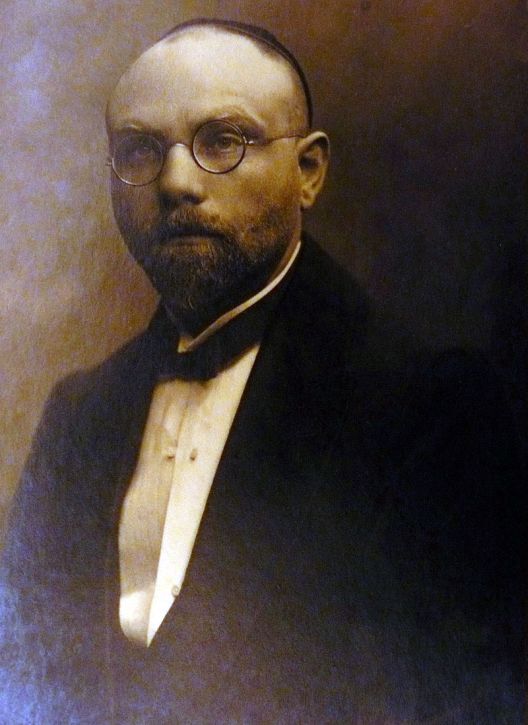
This article was first published in 1995. Now in 5783 it is 99 years since these events and it is being published online for the first time.
For Part II of this series click here.
For Part IV of this series click here.
Part III
Seventy-one years ago, on 29 Sivan, 5784, three pistol shots put an end to intensive efforts which would have nipped the Jewish-Arab conflict in the bud, when Dr. Yisroel Yaakov DeHaan was murdered on his way home from ma'ariv by agents of the Zionist leaders. His death marked the end of the last efforts of the old yishuv to take an active role in the political and diplomatic processes that surrounded Eretz Yisroel. Without DeHaan, the rabbonim of the old yishuv felt they had no way to influence or even participate in international negotiations, and the Zionists were more than happy to assume full responsibility for the future of Eretz Yisroel and even for the Jewish people as a whole, Rachmono litzlan.
The attitude and general policy followed by our rabbonim towards the Arabs — seeking peaceful coexistence, willingness to compromise and high priority for human life — is not something adopted recently as many think, but rather is the same consistent approach that was followed by HaRav Yosef Chaim Zonnenfeld and the other gedolim of the time a century ago. The rabbonim are guided by principles and not political expediency or a desire to favor one or the other political party.
Prior to his murder, Dr. DeHaan had worked for a long time to bring the views and attitudes of the rabbonim of the old yishuv to the attention of the Arab leaders. A long series of meetings and delegations, declarations and written summations took place under the direction and leadership of R' Yosef Chaim Zonnenfeld, zt'l, the rav of Yerushalayim.
Last week we described a meeting between a delegation of Yerushalmi rabbonim, including HaRav Yosef Chaim Zonnenfeld, with the king of what later became Saudi Arabia who was seen as the senior ruler of the Arab world. The rabbonim asked that they always be allowed to present their own approach and not just be represented by the Zionists, and that the Arab leaders treat the Jews living under their rule favorably, mentioning Yemen in particular. The meeting went well.
A scene in old Jerusalem in the 1920s
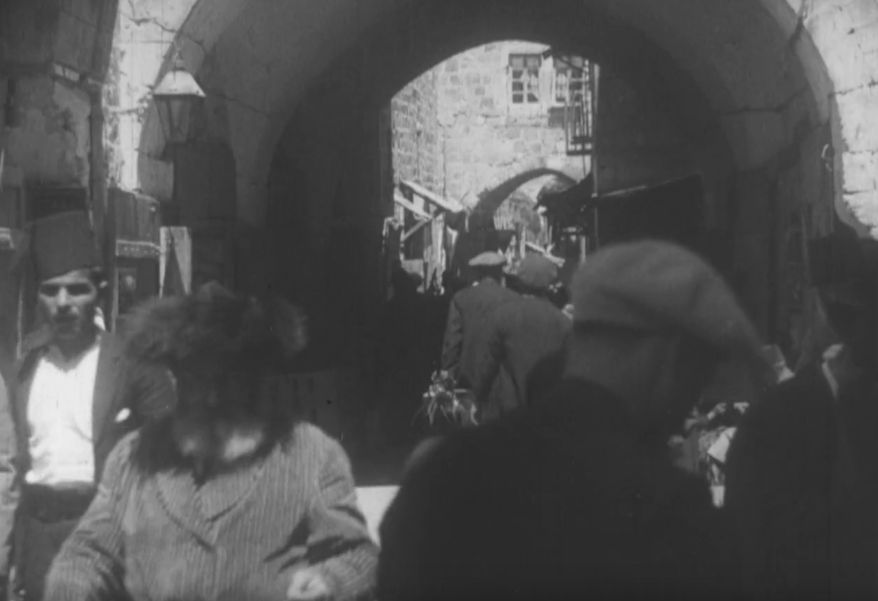
The Reaction to the Meeting
Although the delegates knew the Zionists wouldn't be thrilled about the meeting, they had not expected the uproar that would ensue. The newspapers, representing different political factions, united in a campaign of defamation. Each tried to outdo the other in its choice of sharp, punishing words. The entire country raged:
"Traitors!"
"Informers!"
"Scandalous!"
"Disgusting!"
A few days after the delegation's return from TransJordan, the widespread Arab newspaper Palestine, published in Yaffo, printed an article which referred to statements made by King Hussein to DeHaan. No one in Israel had heard this information before it was printed in Palestine:
"A delegation representing Orthodox Jewry in Eretz Yisroel (headed by Dr. DeHaan) travelled to Shuneh, to bless King Hussein on attaining the position of Caliph. The King received the delegation pleasantly, and, among other things, said: `In my capacity as Caliph of the Moslems, I am obligated to judge fairly. As long as I am Caliph, peace and brotherhood will prevail.'
"In response to a question posed by the leader of the delegation regarding his opinion of Zionism, King Hussein said, `In my opinion, the secular Zionist ideology is unjust towards Moslems, Christians, and Orthodox Jews. As a representative of justice, I will oppose their secular, illogical policies with the full force of my position, by means of the Moslem world!'"
This quote stirred up great controversy in Israel. In truth, it should be pointed out that the article didn't report the precise facts. It was not accurate about the content of the memorandum presented to the King by the delegation. The memorandum made no specific mention of the Zionist organization. In addition, although the King did indeed make the statement attributed to him, he did so eight days after meeting with the delegation. The remark was made in a private meeting between the King and DeHaan that took place in Amman.
In any case, the Zionist leadership seethed with rage.
For years, they had worked to persuade the world—the Arab world in particular—that they, the Zionists, were the sole representatives of the Jewish nation. Now, they saw all their efforts go down the drain.
Colonel Kish, who had himself participated in the Zionist movement's delegation to Hussein, sent an urgent telegram to the TransJordan foreign minister, Faud Bal Katib. In the telegram, he demanded that the foreign minister publicize an immediate denial of the statement attributed to the King:
Faud Bal Katib, the capital of Amman.
The declaration in Palestine regarding the King's purported remark to DeHaan about Zionism is patently false. I seek an immediate retraction—for the sake of our mutual interests.
Colonel Kish
Note the guile underlying the words "our mutual interests." Al Katib's response was quick in coming:
Colonel Kish, Jerusalem.
I have not yet seen the declaration to which you refer. No such conversation took place with Dr. DeHaan or anyone else.
Faud Bal
However, the Zionist leaders in Yerushalaim weren't satisfied with the foreign minister's telegram. Colonel Kish emphatically insisted that an official retraction be printed in Amman's official newspaper, the Amman Gazette. He dispatched his assistant, Jacobs, to Amman with a lengthy and detailed communique. The envelope was addressed to Faud Bal, Foreign Minister, Capital of Amman.
16.3.24
"Dear Faud Bal,
"I am sending the official letter enclosed herein, concerning the subject of our recent telegrams, with my assistant, Captain Jacobs. I would be greatly indebted to you for an immediate reply. I hope that for the sake of our general affairs, you will see fit—after investigating the information presented in the article—to categorically deny it, as I have suggested. I see this as being extremely important from the viewpoint of the interests for which all of us are working.
"I allow myself to remind you that I warned you of the danger of establishing contact with Dr. DeHaan. He is a rabid dog whose main pleasure is biting his own kind...
"Sincerely yours—Kish
The Kosel in the 1920s
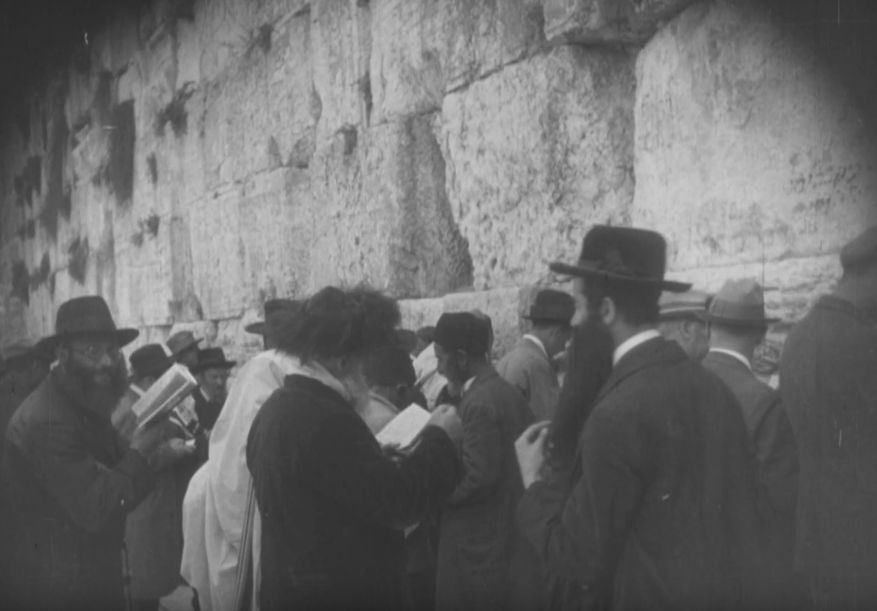
The enclosed letter was much longer:
March 16, 1924
"To Faud Bal Al Katib, Foreign Minister
"Hejaz
"Your Excellency,
"Regarding the information that appeared in Palestine on March 12, regarding the interview that His Eminence King Hussein granted to the delegation of those who are termed "Orthodox Jews," I have the honor of acknowledging the receipt of your telegram this morning. May I comment with satisfaction that I didn't err in my feeling of certainty that no such conversation took place.
"I am hereby enclosing the article in question. As Your Excellency can see, the paper claims that His Eminence, in response to a question asked by the delegation's leader, Dr. DeHaan, stated that the Zionist organization's policies are "unjust towards Moslems, Christians, and Orthodox Jews," and that he would strenuously oppose it with the help of the entire Arab world.
"As soon as this article came to my attention, I said to myself that His Majesty certainly never said anything of the sort. The information was surely written at the inspiration of Dr. DeHaan and his Arab extremist cohorts. Nevertheless, the source of this information doesn't mitigate the resultant damage: The destruction of the excellent impression that was created by His Majesty's sympathetic reception to the Jewish delegation, which I had the honor of presenting to His Majesty on January 27.
"The appearance of this information renders it impossible to continue on the path of general appeasement and mutual cooperation, which we had hoped would lead to results beneficial to both Arabs and Jews. [Our continued work] is contingent upon a categorical and authoritative denial of the above mentioned statement.
"With regard to the issue at hand, His Majesty might be interested in a resolution that was adopted by the Twelfth Zionist Congress, paragraph 9: `In all public matters pertaining to institutions founded or supported by the Zionist Federation, it is forbidden to do anything which isn't in keeping with Jewish tradition. The Executive Committee (Vaad Hapoel) of the Zionist Federation is responsible to ensure the implementation of this resolution.'
"This resolution will be strictly adhered to. On the other hand, the Zionist movement, being a national Jewish movement, includes Jews with a broad range of religious outlooks, and we believe in the individual's right to freedom of conscience. I am conveying this to you because I want very much that His Majesty receive correct information on the subject, about which he was so grievously misled by Dr. DeHaan. However, I am sure that His Majesty will agree that this subject is pertinent only to our community.
"In order to enable us to continue with the task we have taken upon ourselves, I request that you be so good as to print an official denial in Amman's official paper, the Amman Gazette. In addition, please send me a letter that will serve to repair the breach of confidence that has occurred, and attest to His Majesty's good intentions.
"It is my honor to be His Majesty's most faithful servant.
"P. Kish "
Note how this Zionist leader attempts to persuade the Arab foreign minister that the Zionist movement takes Jewish tradition into consideration.
Meanwhile, Dr. DeHaan stood by and laughed. Who would have imagined such an outburst?
He published an article entitled "Denial" in the newspaper Handelsblatt. However, no one wanted to listen. The newspapers unanimously conducted a campaign of incitement and slander against Rav Yosef Chaim Zonnenfeld. They were even more virulent in their condemnation of Dr. DeHaan, the able diplomat who succeeded in presenting the opinion of the chareidim, who wanted nothing more than to live in peace with their neighbors!
Below are select newspaper quotes printed at that time:
"We weren't at all surprised by what occurred in the meeting between the representatives of the international chareidi organization, Agudas Yisroel and King Hussein, ruler of the Hejaz. Nevertheless, there is a lesson to be learned from the episode.
"We know what to expect from this group, which makes the Torah of Israel and her religion a political ideology. To these people, Dr. DeHaan is the symbol of national honor and responsibility. This isn't the first time that they've run, either openly or covertly, to the "Poritz," to inform on the Jewish nation, which aspires to a national life in the land of its fathers. This isn't the first time they have violated our honor among the nations, and undermined the establishment and future of our nation in its homeland.
"Is there any difference, in principle, between Lord Northcliff and Hussein the Hashemite? Whoever approved of DeHaan informing to Lord Northcliff is likely, at an opportune time, to himself act as an informer to the Arab King. Perhaps this new disgrace will finally open the eyes of the naive among us, whose nationalist feelings encompass all branches [of Judaism] and who aspire to include in the task of building even mindless, heartless men, who bear the name of G-d and the Torah of Israel in vain.
"The Admorim, shlita, among them the Admor of Gur, Aguda leaders, were of one mind with the Yerushalmi informers. Their last act here in the Holy Land—to which they came in order to make peace — was to give their approval to that disgraceful document. A document which wreaked destruction and desecrated the name of Israel to an extent not seen since the hate-filled letters of Geshem the Arab and Tovia the Ammonite. [Editor's Note: The reference is to the first chapters of Nechemia.]
"Let the matter be written down, so that it not be forgotten, and so that our naive religious brothers throughout the world—those millions in whose name the Aguda leaders speak—will know who their leaders are, and what they are doing." (Ha'aretz)
The following Mizrachi mouthpiece found it appropriate to entitle its inflammatory article Mazkeret Avon.
"...This method of informing and backbiting, with the intent of disrupting and halting the Zionist work, already has a full history... such missions are based on lowly and despicable slander..."
As we have mentioned, these are but a few examples. The papers daily published inflammatory articles, filled with frightening statements that penetrated the readers' consciousness and are eventually easily translated into action.
And that is indeed what happened. The public internalized the message. It was no longer taboo to talk of using a pistol to solve the problem named DeHaan.
Today they cry: "Peace now!"
The Shaarei Zedek hospital when it opened in 1902
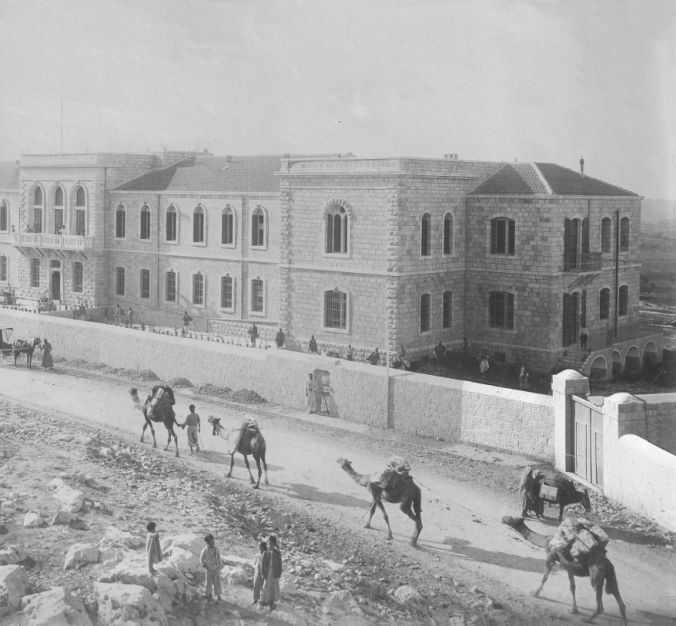
The Liquidation of DeHaan
On the evening of the twenty-ninth of Sivan, 5684, shortly after 7:30, Dr. Yisroel Yaakov DeHaan walked out of the shul that was on the premises of Sha'arei Tzedek Hospital. Three bullets were fired, and Dr. DeHaan fell in a pool of blood. He was murdered in cold blood by fellow Jews, the first person in Eretz Yisroel to be killed for political and ideological motives. In that narrow street, all hopes of peace between Jews and Arabs in Eretz Yisroel at the time, died with him.
A Seemingly Ordinary Evening
Now the building is no longer used. The Sha'arei Tzedek Hospital, founded to serve the old yishuv of Yerushalaim, has moved to a large modern campus near Bayit Vegan. The "old Sha'arei Tzedek" building that used to be on the outskirts of Yerushalaim of yesteryear, stands empty. It has been mentioned for development as a communications center, but so far chareidi opposition, fearful that such a center would attract many undesirable elements, has blocked those plans.
Seventy-one years ago, the hospital was a vital part of the community, and it also housed a modest shul. Ma'ariv in its small synagogue was over shortly before 7:30 on that Monday, 29 Sivan, 5684 (1924). The worshipers made their way out the gate leading through the stone wall that to this day still surrounds the now abandoned grounds of the "old" Sha'arei Tzedek. Two of them lingered. One was Dr. Moshe Wallach, the founder and director of Sha'arei Tzedek, the other was Dr. Yaakov Yisroel DeHaan. Those leaving the hospital surely did not notice the man standing opposite the exit facing the street which today bears the name Sha'arei Tzedek Lane and which connects the two main thoroughfares of Rechov Yaffo and Rechov Agrippas. The man was waiting for Dr. DeHaan to leave.
When DeHaan finished, it was already 7:35. He went outside. The shadowy figure looked at a friend standing nearby, who signaled that all was clear. Thereupon, he withdrew a small pistol from his pocket and fired three shots at Dr. DeHaan's chest. The latter fell to the ground, mortally wounded, and the two assassins fled down Rechov Sha'arei Tzedek towards Agrippas Street.
The sound of shots brought a crowd to the scene of the crime. They congregated around the entrance and Dr. Wallach was summoned to administer whatever help was still possible. No police appeared, even though the scene of the crime was not far from two major police stations. DeHaan was taken into the hospital and Dr. Wallace tried to help him, but his efforts were in vain. A short while later, Dr. Wallach determined the death of his friend. Before he died, DeHaan managed to whisper that his murderer had worn a white suit.
It seemed strange at the time that Yaakov DeHaan was dead by the time the police arrived on the scene, even though they were summoned from the closest stations—that of Machane Yehuda and of Romema. By the time they came, there was little they could do. The British police opened an investigation, arrested a few suspects, among them Manya Shochet, wife of Yisroel Shochet, one of the heads of the Haganah and Hashomer. They interrogated many of DeHaan's political enemies but failed to discover the murderer. No one was ever tried for this first political murder in the Jewish yishuv in Eretz Yisroel.
Shaarei Zedek street today
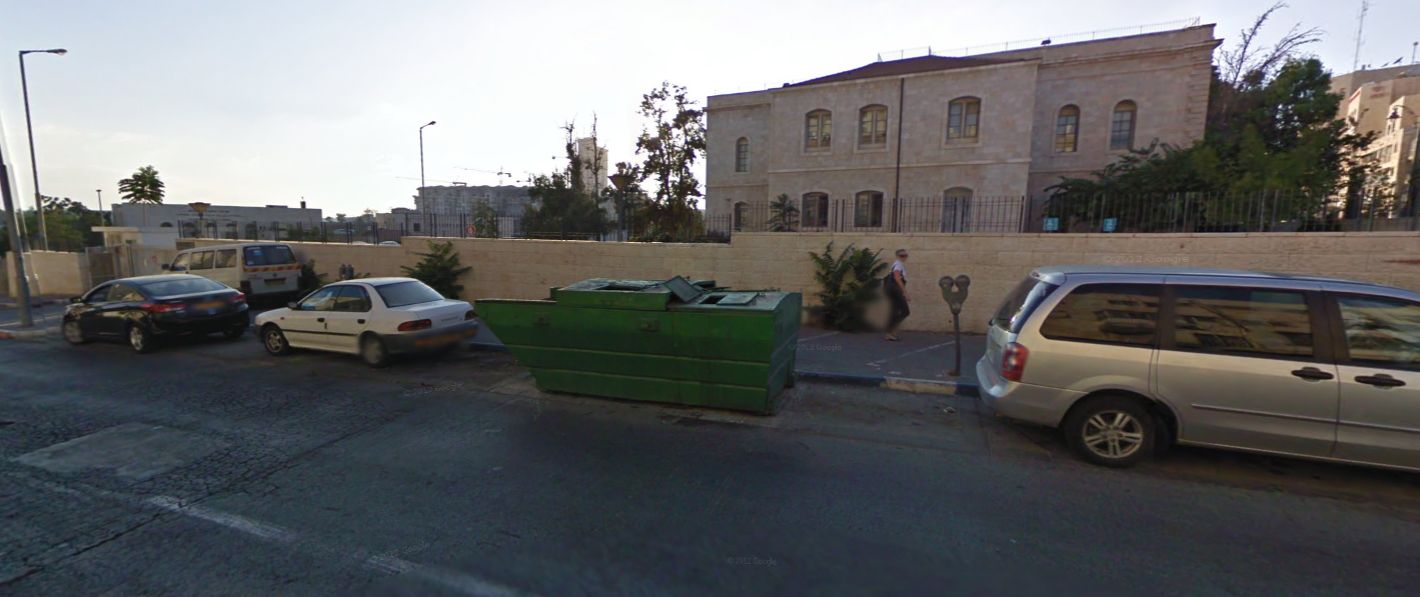
The "Official" Version: Arab Assassins — The Truth: the Haganah!
For many years, the general public had the impression that DeHaan had been a victim of Arab terrorists, even though no proof was ever offered. Agudas Yisroel vehemently maintained, especially during the years immediately following the murder, that it had been a political murder, premeditated and executed by the Haganah and under official orders from the leaders of the Zionist movement. Agudas Yisroel pointed an accusing finger at Rachel Yanait Ben Zvi, wife of Yitzchok Ben Zvi, [who would become] second president of the State of Israel, but who served at the time in the command of the Jerusalem Haganah headquarters. They noted that DeHaan had been vehemently denounced in the Zionist press, and that it was a matter of public record that the Zionist leaders were worried about his activities. Their accusations were ridiculed.
In 1959, with the appearance of the official book, The History of the Haganah, it suddenly came to light that the Agudas Yisroel claim was true. The book explicitly stated that DeHaan had been executed by the Haganah for his anti-Zionist political activities and his efforts to build a dialog between the chareidi community and the Arab leaders.
Further proof to the Aguda version was produced in 1970 when, after delay and impediments exerted by Rachel Yanait Ben Zvi against the Israel Broadcasting System, an investigative program was aired on the radio that had been produced by Chanina Amotz. The interview was aired in November 1970, and again on November 21, 1971.
Among the people interviewed during the program was David Tidhar, a Haganah man who had been in charge of the Machane Yehuda police station on the day of the crime. His words were the linchpin of the argument revolving around the political responsibility for DeHaan's murder. They were quoted in an article in Kol HaIr written by Arye Dayan and are also cited in the Hebrew edition of HoIsh Al HaChomah, a biography of HaRav Yosef Chaim Zonnenfeld written by Rav Shlomo Zalman Zonnenfeld, volume III, page 297. DeHaan had been on the verge of a trip to London in behalf of the chareidi community of Yerushalaim:
"After he had done so much damage, the Haganah decided to liquidate him and not allow him to go to London. If he had remained alive, he would have made trouble. I am sorry that I was not given the job of eliminating him. My job was to protect his assassins. DeHaan used to come to daven mincha (sic) in the Sha'arei Tzedek synagogue. I was the officer in charge of the Machane Yehuda police station, most of whose policemen were Arabs. I was asked to see to it that, between the hours of three and five [that day], no Arab officer would be on duty.
"I switched all the Arab officers for Jewish ones and informed them that if they heard shots, they were not to make a move until they received personal orders from me. After I had made these arrangements, I drove to the scene of the future crime and waited for the shot. As soon as DeHaan emerged from the side door of the synagogue, those shots were fired. The sharpshooter was so adept that the shots formed a segol, which immediately felled the victim. I appeared on the scene at once, knowing where the assassins had been told to flee. I directed my men to run towards the Bucharim section, the reverse direction of the Orpalim neighborhood.
"Many rumors ran rampant. Some said that Manya Shochet had done the shooting. Others said that it had been a Haganah person. The Aguda people refused to believe the rumors. They stubbornly insisted that I was the culprit since I had appeared so rapidly on the scene."
The reason that they asked Tidhar to see that no Arab policemen were around is that they were afraid that Arab officers may try to do their job and catch the murderers.
The following sources were utilized in the preparation of this article: HaIsh al HaChomah, Mara De'Arah Yisroel, Amudah Denehorah, DeHaan—HaRetzach HaTzioni HaRishon beEretz Yisroel, Retzach BeYerushalayim, and material from the A.P. Archives.
End of Part III
|




